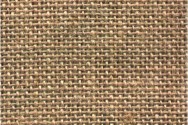Pat, which means “a braid of hair,” is the Bengali word for Jute. Only second to cotton, jute is the most commonly used and most affordable natural plant based fibre in the world. Jute fibres, which are soft and shiny, are taken from the outer skin of the jute plant and spun into strong course threads.
The popularity of jute can be attributed to its versatility and to the fact that it needs just rainwater, and very little fertilizers or pesticides to grow. Jute is also 100% biodegradable, an eco-friendly quality that further contributes to its popularity.
History:
Jute has been used for centuries to make ropes, sacks, rugs and even clothing. Its origins can be traced to India, and more specifically Bengal. It was in the 17th century, during British colonial rule in India, that jute was introduced in England. Towards the end of the 17th century, spinning machinery made it easier to process jute into finer thread so it could be utilized in so many more ways. The finer jute thread made it possible to weave jute on hand looms to create jute based fabrics.
Artisans:
Frequently referred to as “The Golden Fibre of Bangladesh,” jute continues to be central to Bangladesh’s industry and culture. Our partners, Action Bag construct stylish and trendy bags and totes from locally grown and woven jute fabrics. Action Bag never fails to impress with the quality and attention to detail that is evident in all their hand-made bag products.
Our Partnership:
Azadi Project is proud to support an industry that is so central to the history and culture of Bangladesh’s rural communities. Our jute bags help preserve the work done by jute farmers, harvesters, refiners, spinners & weavers. The eco characteristics of jute’s pure fibre and biodegradability, as well as it’s durability and natural beauty, make it a perfect choice for our collection and our customers.

